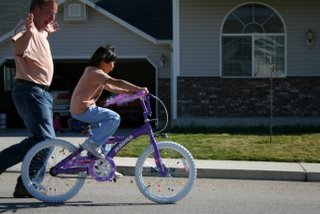Meikina's First Bike Ride
 Just this past Summer, Meikina at eight years old became certified in "long-distance" bike riding. As she has progressed, I am reminded of the afternoon two years ago when she first "flew solo".
Just this past Summer, Meikina at eight years old became certified in "long-distance" bike riding. As she has progressed, I am reminded of the afternoon two years ago when she first "flew solo". ______________________________
“You’re doing it, you’re doing it!”
On this warm, Spring Saturday afternoon I found myself running beside Meikina as she took her first unassisted “flight” on her two wheeled bicycle. As I ran beside her, I gripped the handlebars as she nervously peddled as fast as she could. I warned her that I was going to let go, something I had promised her I wouldn’t do unless she gave her permission. She acknowledged what I said, a look of intense trepidation coming upon her face, but nodded that she was ready to fly.
“You’re doing it! You’re doing it!!” I shouted as she rode away from me. I was so proud of her, because I knew that it had taken her a long time to get to this point. Before today, Meikina had insisted she would never ride her bike.
I purchased Meikina’s first bicycle for her fourth birthday. It was a pretty pink toddler bike with training wheels. After a few weeks of riding around the street with the training wheels, I pushed her to try riding it without the side wheels. I wanted her to learn to ride at four because I had spied a four-year old neighborhood boy out riding his bike unassisted, and his bike was even bigger! She never did, and so she outgrew that bike on her way to six-years
old. Santa decided she needed a new bike last Christmas, and Meikina found a beautiful new purple bike waiting for her under the tree on Christmas morning. This bicycle, however, had no training wheels.
As parents, we like to think that our children are the smartest, the quickest to learn, the most beautiful (all right, maybe the cutest). Nothing incites the spirit of competition faster than watching another kid of the same age accomplish something your child hasn’t. We push our kids to excel, not just to teach them their own capabilities, but to confirm and reassure ourselves that we are doing well as parents. The better they do, the better we feel we are
doing.
Which is why we have such a tough time going to Parent-Teacher nights. To learn from an objective source that one’s child is not the brightest star in the class is tough, at least it is for me. This year has brought this lesson home for me as Ms. Swenson, Meikina’s first-grade teacher, reviewed Meikina’s progress in math. “You can see here that she hasn’t quite grasped the concept of patterns,” she intoned. Feverishly, my mind sought an explanation other than the fact that Meikina didn’t grasp patterns. “Perhaps,” I countered, “she is expressing her
artistic side.” The teacher’s glance showed me she didn’t think so. “Well, are any other kids in the class able to do this?” I asked after discussing another problem area. “Yes, a few are able to do it.” Well, I thought, we will go home tonight and master this concept, if we have to spend all night doing it!
We push our kids because as parents it makes us look good. Their excellence in school, on the field, in their dancing class, is evidence that we are good parents, that we are doing things “right”. Thus, our pushing is part desire for our children to reach their potential, part need to have our own parenting abilities validated.
But life eventually shows us that our children will learn at their own pace, experiment when they feel comfortable doing so, try new skills when they want to. As I pushed Meikina in math in the weeks following the Parent-Teacher night, I saw the frustration and anger come into her face as she genuinely struggled to grasp some of her lesson concepts. I realized that although she might not be the smartest in math (at least at this point), she had many other areas in which she did excel – reading, class participation, empathy. I realized that my skills as a parent needed no validation from Meikina’s accomplishments. I realized that by pushing my daughter too much in a desire to keep her ahead of her classmates, I was in danger of damaging the one thing I did hold most dear, my relationship with her.
So, as Meikina drifted away from me on her purple, two-wheeled bike, I was filled with an intense feeling of pride. Pride that my daughter had successfully conquered her fears. Pride that she had trusted me to teach her how to ride. Pride that she had accomplished this feat in her own time, on her own terms.
“You’re doing it! You’re doing it!”
Words I hope to speak often to her in the coming years.

